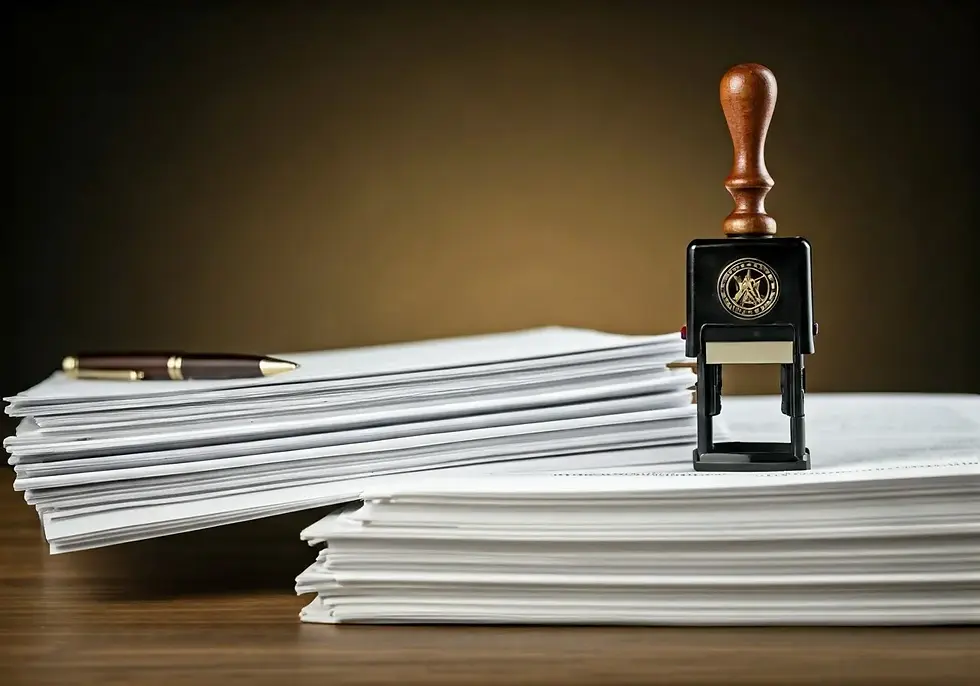Why Do I Need Notary Services for Real Estate Transactions?
- Joseph Marriott
- Nov 23, 2024
- 3 min read
Real estate transactions can be complex, involving numerous documents and legal processes. Understanding the role of notary services is crucial in ensuring a smooth and secure transaction. In this FAQ, we'll explore why notary services are essential when dealing with real estate.

What Are Notary Services?
Notary services involve the witnessing of signatures and the authentication of documents by a certified notary public. This process ensures that documents are genuine before they are used in any legal transactions.
At the heart of notary services is the role of verifying a person's identity. This verification is not just about checking a signature; it's about confirming authenticity and ensuring that the person standing in front of the notary is indeed who they claim to be. Notaries accomplish this by verifying identification documents like passports or driver’s licenses.
The essential function of notary services extends beyond mere signature validation. Notaries play a vital role in preventing fraudulent activities by verifying identities and overseeing the signing of critical documents. In real estate, where large sums are exchanged, this layer of security is invaluable.
Why Are Notary Services Important in Real Estate?
In real estate transactions, notary services provide an additional layer of trust and legality. They ensure that documents such as deeds and titles are properly executed, eliminating the risk of fraud or legal disputes.
Real estate transactions are significant financial endeavors, often involving intricate paperwork and significant investments. Notaries act as neutral third parties ensuring all involved parties understand and agree to the terms outlined, thereby safeguarding everyone’s interests and mitigating potential disputes.
The role of the notary extends to maintaining detailed records of notarizations, which can be pivotal when resolving future disputes. This accurate documentation adds a layer of transparency and ensures any disagreements can be managed swiftly and effectively.
How Do Notary Services Protect Buyers and Sellers?
Notaries verify the identity of all parties involved and ensure they understand the documents they are signing. This protects both buyers and sellers from potential issues such as identity theft or undisclosed conditions.
Real estate transactions can be vulnerable to various forms of identity fraud and misrepresentation. Notaries minimize these risks by diligently confirming identities and verifying the clarification of the involved parties, thus protecting buyers and sellers from unexpected legal disputes.
The protective role of notaries is further amplified during closings. By acting as neutral witnesses, notaries ensure that every document signed is agreed upon under full understanding and absence of duress, providing both parties with a sense of security.
What Documents Typically Require Notarization?
Common real estate documents that require notarization include property deeds, mortgage agreements, and affidavits. Notarization confirms the validity of these critical documents before legal processing.
In the realm of real estate transactions, notarization is typically needed for vital documents such as deeds, liens, powers of attorney, and mortgage contracts. Without proper notarization, these documents might lack the necessary legal backing required for the transaction to be effectively recognized.
The necessity of notarization for certain documents is rooted in the need to safeguard the integrity and enforceability of legal agreements. By ensuring these documents are notarized, parties involved can feel more secure about proceeding with substantial property exchanges.
Final Thoughts on Notary Services for Real Estate
Notary services provide an essential layer of security and authenticity to real estate transactions. By understanding the role and importance of notaries, you ensure that your transactions are conducted legally and safely, giving you peace of mind. For more detailed information on real estate closings and title services, be sure to visit our website.



Comments